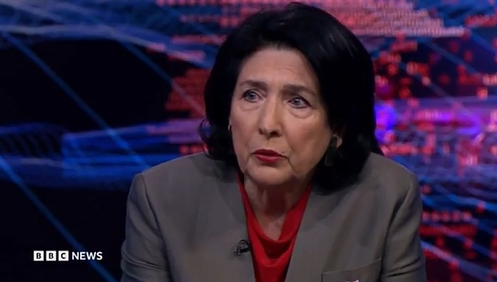
President Zurabishvili in BBC’s HARDtalk
In an interview with BBC HARDtalk, President Salome Zurabishvili said she believes that the people of Abkhazia “might want to be part of European Union together with Georgia,” adding that it is the “perspective” Georgia could offer to Abkhazia, answering to BBC journalist proposition that “the people of Abkhazia may not want to be part of Russia, but they do not want to be part of Georgia.”
She noted that Tskhinvali region has essentially become a “large military base” under the Russian occupation with people living there “basically” working for the military. “You can not talk about political will,” – Zurabishvili added.
In the interview, President Zurabishvili also spoke about Russia’s war of aggression against Ukraine and the threats it poses to Georgia, as well as about Georgia’s domestic issues, including GD founder Bidzina Ivanishvili, ex-President Mikheil Saakashvili, and the upcoming Parliamentary elections in October.
Discussing Russia’s war of aggression against Ukraine and Russian threats to Georgia, President Zurabishvili noted that “Russia wants to control not only Georgia, but probably parts of Europe,” and therefore not only Georgia, but everyone should be afraid if President Putin succeeds in Ukraine, although she noted that she believes this won’t happen as “Putin has lost all his ambitions in Ukraine.”
Asked about Russia’s plan to open a permanent naval base in occupied Ochamchire, Abkhazia, Zurabishvili said “it’s very important what happens to this port.” She stressed “Europeans should realize that the Black Sea is at stake” adding: “Nobody could afford Russians to take control of this part of the Black Sea.” She added that the EU should consider that “the Black Sea is the de-facto European sea” and not allow Russia to push the EU out of the Black Sea. She called EU to act now, instead of waiting till the Ochamchire port is built, mentioning among possible measures the increased port calls in Batumi and Poti and investment in Anaklia port.
When asked about Georgia’s increased trade relations and economic dependence on Russia, Zurabishvili said that Georgia is “a bit more” dependent on Russia, although she stressed that this does not mean that Georgia is “closer” to Russia.
Asked about Georgia’s stance on Euro-Atlantic integration while also aligning with Russia, President Zurabishvili reiterated the Georgian people’s unwavering support for the West. However, in response to the journalist’s question about the Georgian government officials who seem to “play both sides,” Zurabishvili said, “governments come and go”. She also noted that “the Government has changed its rhetoric” since Georgia was granted EU candidate status, referring specifically to the new Prime Minister Irakli Kobakhidze, whose rhetoric Zurabishvili described as “a completely new” and “very pro-European.”
President Zurabishvili also discussed the return of GD founder Bidzina Ivanishvili to politics in the context of de-oligarchization. She clarified that de-oligarchization, as one of the conditions set by the European Commission, refers to ensuring the “system of prevention of oligarchization” rather than targeting a specific individual. She noted it was “good” that Ivanishvili had returned to politics because the problem of “shadowiness…not knowing where the source of power is” had been removed. However, she said that the need for de-oligarchization is not Georgia’s biggest problem, but it is rather the one-party system, and expressed hope that Georgia will move to a coalition government.
Asked about her plans for the upcoming parliamentary elections in October, Zurabishvili confirmed that she does not plan to run for office, but will remain President “until the end”.
She brushed off the comparisons between Saakshvili and Navalny saying that “Saakashvili is not Navalny”. She said that it is not up to her to decide whether Saakashvili should be in prison or not. She also said that she did not believe the allegations that Saakashvili had been tortured or poisoned in prison. Regarding a pardon for Saakashvili, Zurabishvili said that it would be her own “moral decision” and that the more pressure she is under, either from inside or outside Georgia, to pardon Saakashvili or not, “the more difficult it will get [to decide anything],” adding that it remains a “question mark” whether or not she will pardon the ex-President.
Also Read:
This post is also available in: ქართული Русский